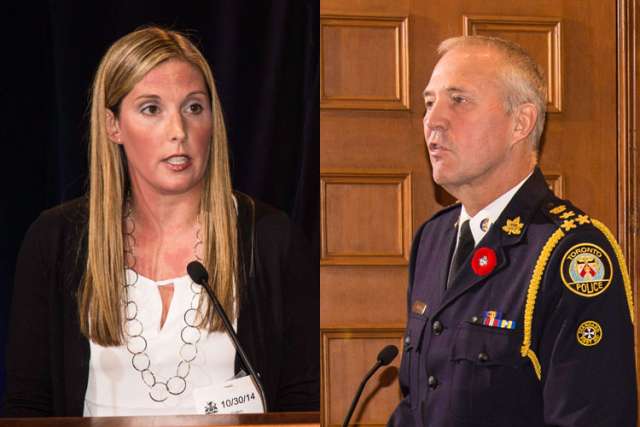The four agencies highlight child abuse and try to educate the public about how they can prevent it every October. For 14 years the Catholic, Jewish, Native and Toronto children’s aid societies have declared October “child abuse prevention month.” Each year the four agencies bestow their annual Stand Up For Kids awards in October.
Blair was honoured for his role in setting up Toronto’s first Child and Youth Advocacy Centre, which gathers the four children’s aid societies and the police under one roof to expedite investigations into abuse and ensure the child victims are the first priority.
“There is no higher calling than the protection of children,” said Blair as he accepted the award.
Blair also serves on the board of Covenant House and the Children’s Aid Society of Toronto.
Felton was given the award for her intervention on the part of one of her students. With the girl already reeling from abuse and suddenly without family, Felton wanted to make sure she didn’t have to change schools and lose all her friends as well.
The gym teacher started by driving the girl from a group home in one part of the city to Dixon Grove Junior Middle School in the tough neighbourhood near Dixon Road and Kipling Avenue. Then she deepened her responsibility for her student by becoming her foster mother.
“This young woman has taught me courage,” Felton said.
“We all look back on our childhood and school years and remember one teacher who was a significant part of making us the person we became. You, obviously, are one of those teachers,” Minister of Children and Youth Services Tracy MacCharles said after Felton accepted her award.
The awards are given in the hope of highlighting the issue and teaching people about their duty to report suspected child abuse, said Mary McConville, Catholic Children’s Aid Society of Toronto executive director. While abuse is not the taboo subject it once was and more people understand how to report it, there are still occasions when abuse is not reported.
Often new immigrants with limited language skills and uncertainty about Canadian law feel they can’t report their suspicions. In other cases, people simply don’t know what to look for or they are unclear about what they should report, or who they should report it to, said McConville.
The legal obligation that now exists for teachers, school principals and health care professionals to report abuse has improved the chances abuse will be reported, but the children’s aid societies still feel they’ve got an education job to do with the public.
“It’s a public duty,” McConville said.


